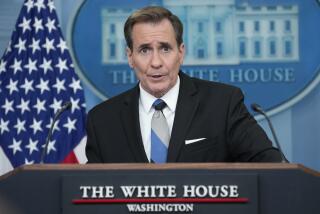Loss of Hundreds of Thousands of Defense Jobs Predicted : Pentagon: New policy will not prevent consolidation in the industry and is designed only to preserve critical technology, official says.
- Share via
WASHINGTON — The Pentagon warned Thursday that its new “industrial policy” for the defense industry is not designed to save defense firms from consolidation and predicted that hundreds of thousands of additional defense-related jobs will be lost over the next several years.
In a session with reporters, Deputy Defense Secretary William J. Perry said the program is intended only to preserve critical technology in fields such as submarine construction that are needed for military purposes and for which there is no civilian market.
“We’ve already lost hundreds of thousands of jobs and there are that many more ahead of us to lose,” Perry said. “This is not a bailout for any companies . . . . We clearly expect many defense companies to go out of business. And we will stand by and see that happen.”
Despite the Administration’s concern for those who have been laid off, he said, the government will continue to press the industry to consolidate and to get rid of unneeded facilities and workers--if only to guarantee that surviving firms will be healthy later on.
In fact, he said, the Administration already is exploring the possibility of asking Congress to relax current antitrust restrictions to permit more mergers within the defense industry--even where the consolidation leaves only one company monopolizing a market.
The proposed industrial policy for the defense industry--announced Wednesday as part of the long-awaited “bottom-up review” of overall defense policy--seeks to keep part of the defense industrial base intact, essentially by buying some weapons even if they are not needed.
The Pentagon announced Wednesday, for example, that it would buy a third Seawolf attack submarine solely to enable the Electric Boat Co. in Groton, Conn., to maintain its specialized technology and skilled personnel.
It also disclosed plans to buy a new nuclear-powered aircraft carrier from the Newport News Shipbuilding Co. of Newport News, Va., for much the same reasons.
Officials said the alternative would have been to shut both companies and risk losing critical skills.
The Administration also has served notice that it plans to contract out parts of the overhaul and maintenance work done by the dozens of huge military “depots” throughout the country to private defense contractors.
Here, again, though, Perry cautioned that the military still would retain responsibility for overhauling and maintaining core programs that the individual services believe must be done in-house. He said the plan is in early stages of development.
The Administration has developed a spate of other programs to help ease the transition for defense workers, communities that have heavy concentrations of defense-related firms and companies that want to reshape their goods for sale in civilian markets.
But those programs, too, are regarded as limited. Rather, economists said, the biggest boost for laid-off defense workers would be for the economy to pick up generally, benefiting all sectors of manufacturing.
The government’s concern about the nation’s industrial base represents a major departure from the position of the George Bush Administration, which asserted that the government should decide on the size of the military without regard to impact on the defense industry.
“The previous Administration . . . explicitly rejected the idea that we should consider the defense industrial base (in) making decisions,” Perry said. “We have explicitly accepted the judgment that we need to consider the defense industrial base.”
Perry argued that the push to maintain critical technologies also would prove valuable if the situation in the former Soviet Union worsens and the military there once again becomes a major threat, as it was during the Cold War.
The United States, with its technology and facilities still intact, could quickly expand its military capability, he said. But if critical facilities are shut, the nation would need much more time to revive its military force.
In surveying the future, Perry said he expects that once the defense industry sheds its extra capacity, it will regain its health and end up as vigorous in the late 1990s as it was in the late 1970s--with plenty of business to support its production lines.
But, he declared, the industry consolidation will mean additional layoffs. “If the industry tries to maintain this excess capacity, then it is not going to be healthy,” he said.
Under the cuts that the Administration has proposed, the number of people in the military would shrink to 1.4 million by 1999, compared to a 1.6 million total envisioned by the Bush Administration.
More to Read
Sign up for Essential California
The most important California stories and recommendations in your inbox every morning.
You may occasionally receive promotional content from the Los Angeles Times.













